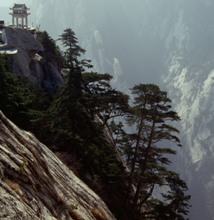Ecological plan to protect the 'dragon's vein of China'
September 20, 2010:
 |
 |
 |
The Huashan Declaration aims to protect spiritual as well as natural ecology |
An ecological forum attended by Daoists and local government officials in Huashan, in Shaanxi Province, has issued a stirring declaration of China's determination to protect one of its most ancient and revered sites – the Qinling Mountain range.
The Huashan Declaration came during the formal implementation of measures to protect the natural ecology of the Greater Qinling area - and places equal importance on the need to protect the region's 'spiritual ecology'. Its goal is:
• green mountains
• clean water
• blue sky
• people in harmony
The Declaration was announced during an ecological forum on September 4, organised by the Huashan Scenic Area Management Committee, the Huashan Daoist Association and Shaanxi Jinduicheng Molybdenum Group, and hosted by the Daoism Centre of Shaanxi Academy of Social Science and China Business News.
The forum celebrated the formal implementation of Qinling Ecological Protection Article, developed to protect this extraordinary, biologically rich and culturally important region of China.
'The dragon's vein of China'
Home to the Giant Panda and lying between the Yangtze and the Yellow Rivers in China's Shaanxi Province, the Qinling Mountain range has been called the 'dragon’s vein of China' and the 'father mountain of China'.
In ancient times, it was also known as the 'great warehouse of medicine' thanks to its dense forests, beautiful vegetation, rich resources and biodiversity; even today, so healthy is the mountain air that it is widely spoken of as the 'lungs of the Earth'.
Traditional Chinese ecological thinking emerged here thousands of years ago and according to the Huashan Declaration, the Qinling region also 'helped to construct spiritual ecology of the nation', with both the great Daoist text, the Dao De Jing, and the first Chinese translation of Buddhism’s Diamond Sutra originating here.
The Sacred Mountain
The Huashan Declaration states:
• Greater Qinling belongs not just to Shaanxi, not also just to China, but to the whole world. It is the sacred mountain of Shaanxi of China and indeed of the world. Therefore, to protect Qinling is not just responsibility of people of Shaanxi but of all the Chinese, and even people on the earth.
• Greater Qinling belongs not only to history but also to the future. We should discover and understand the natural landscape of Qinling, its beautiful cultural and geological heritage. We should strengthen the sense of following nature, promoting harmony between man and nature, and ultimately facilitating sustainable development.
• To protect Qinling is to protect our heart, our lung. This needs to be done in two ways: to protect natural ecology and to protect the spiritual ecology; not just the natural life but also the spiritual life.
• The key way to protect Qinling is to promote a simple, low-carbon lifestyle; to save energy; and to reduce carbon emissions; to use resources wisely; and to develop scientifically.
To read the Huashan Declaration in Chinese, click here.
The Declaration builds on ARC's work with China's Daoists and Buddhists since the 1990s, in particular its initiatives on the biodiversity of the key Daoist sacred mountains.
This includes ARC's report on sacred land, published in 1997, and 13 years of work to create an eco-temple at Taibaishan, developed with the Ecological Management Foundation (EMF), where training programmes in environmental education are provided for Daoist monks and nuns.
It shows ARC’s solid commitment to measures to protect the environment in China, said ARC director Martin Palmer.
China's Minister for Religious Affairs
The Huashan Declaration came as the greater development of ARC-supported religious and conservation projects in China received powerful support from China's Minister for Religious Affairs in a meeting held earlier this month.
To read more about ARC's meeting with Minister Wang, link here.
|

